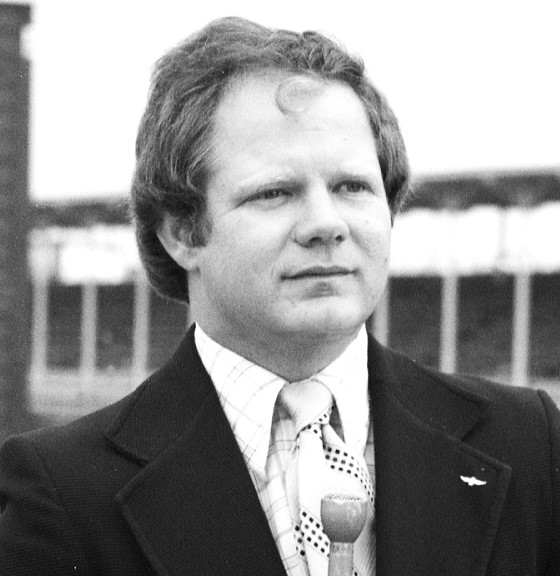PAUL PAGE - 11/25/1945 -

Paul Page was born in Evansville, Indiana, but grew up as an "army brat," moving several times, spending time in Stuttgart, Germany, Fort Belvoir, and Fort Sheridan. Page's birth father separated from his mother when he was young. His mother remarried, at which time his surname changed from Henstridge to Page, the last name of his step-father. Page went to twelve different schools from elementary to high school, and he graduated high school in Highland Park, Illinois. He studied at the University of Tulsa. He served six years in the U.S. Army. Page's son Brian is a member of Bryan Herta Autosport. Page's broadcasting career began at WAIV and WATI, after which he moved to WIBC in Indianapolis, Indiana in 1968, where he was mentored by Sid Collins. On December 1, 1977, while doing a helicopter traffic report, Page was nearly killed in an accident, as the helicopter he was riding aboard crashed near Speedway Senior High School in Speedway, Indiana. Page suffered a compound fracture of his ankle, but soon returned to his duties. From 1974 to 1987, Page served on the Indianapolis Motor Speedway Radio Network (IMSRN). He served as a pit reporter from 1974 to
1976, and as Chief Announcer from 1977 to 1987. Page was considered the hand-picked successor to Sid Collins at the IMSRN. Page took over as chief announcer after Collins committed suicide. In April 1977, Collins was diagnosed at the Mayo Clinic with amyotrophic lateral sclerosis (ALS) or Lou Gehrig's disease. After learning he had the incurable progressive paralyzing disease, Collins confided to Page that he was planning to take his own life. Collins committed suicide on May 2, 1977. He was 54. Page left WIBC, and moved to NBC. He served as anchor of auto racing telecasts on NBC Sports from 1978 to 1987, covering Indy cars, NASCAR, Formula One, and the NHRA. In the 1980s, Page was also a commentator for the motorsports show American Sports Cavalcade on the cable network TNN. While working for TNN, he covered NHRA, World of Outlaws sprint car racing, AMA supercross, monster trucks, tractor pulls, and swamp buggy racing, among others. In the fall of 1987, Page switched to ABC Sports, and was their lead anchor for CART Indy car racing, including the Indianapolis 500. During this time, the three-man booth of Page, Bobby Unser, and Sam Posey became a fixture of the Indy 500 telecasts. During his time at ABC, Page also anchored NASCAR and IROC broadcasts. Parallel to his work at ABC, Page also worked at ESPN, primarily as the anchor for CART Indy car telecasts. When the IRL was founded in 1996, he started covering those events as well. His work on the Indianapolis 500 in 1989 and 1990 help earn the Sports Emmy award for "Outstanding Live Sports Special." Page worked both CART and IRL events from 1996 to 1998, then for a brief time from 1999 to 2001 was shifted to CART events exclusively. He moved back to full-time covering the IRL/IndyCar for 2002 when ABC/ESPN dropped CART/Champ Car from its lineup. Page's place on ABC's IRL/IndyCar coverage was taken by Todd Harris for the 2005 season in a move that proved unpopular. Page was reassigned to cover other events for the ESPN family of networks, most notably the X Games, NHRA, and the annual Nathan's Hot Dog Eating Contest. In 2006, Page shared announcing duties with Marty Reid for ESPN's coverage of NHRA Drag Racing, then took over NHRA full-time from 2007 to 2012. In 2009, Page returned to the IMS Radio Network coverage of the 2009 Indianapolis 500. He joined the booth as a guest analyst. It was Page's first Indy 500 race he covered since the 2004 race. He reprised the role in 2010–2013. In December 2013, it was announced that Page would return to the role as the radio Voice of the 500. He replaced Mike King for the 2014 and 2015 race, after King tendered his resignation. Page also called the 100th Indianapolis 500 broadcast in 2016, but handed over duties after the start to the next 'Voice of the 500', Mark Jaynes. Page returned to the broadcast in subsequent years, sitting in the booth multiple times as a guest analyst. He received awards as a member of the Indianapolis Motor Speedway Hall of Fame. In 1989 and 1990, his work was awarded two Emmys for the coverage of the Indianapolis 500. He also was host / play by play in shows or series that garnered 13 other Emmys.
